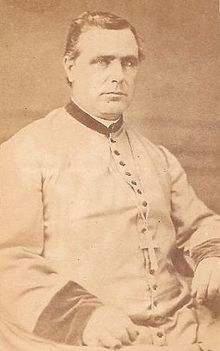Joseph Gregory Dwenger
| Joseph Gregory Dwenger | |
|---|---|
 |
|
| Born | April 7, 1837 |
| Died | January 22, 1893 (aged 55) |
|
Styles of Joseph Gregory Dwenger |
|
|---|---|
 |
|
| Reference style | The Most Reverend |
| Spoken style | Your Excellency |
| Religious style | Monsignor |
Joseph Gregory Dwenger (April 7, 1837 – January 22, 1893) was the Roman Catholic Bishop of Fort Wayne (1872–1893).
Dwenger was born near Minster, Ohio, in 1837. Orphaned at an early age, he was educated by the Fathers of the Precious Blood, entered their community, and was ordained priest 4 September 1859. Appointed professor in the seminary of his community, he filled that position until 1862, and was then assigned to parochial work. From 1867 to 1872 he was occupied in preaching missions.
He was consecrated 14 April 1872. During his time in office he supported the congregation of the Poor Handmaids of Jesus Christ, as had his predecessor Bishop John Henry Luers. He allowed Father Edward Koenig - who had served as advisor to the sisters since their arrival - to remain in office in their Motherhouse in Fort Wayne. The good relationship continued, and in due course the congregation opened many schools, orphanages and hospitals in his and the neighbouring dioceses. Especially the establishment of orphanages were at his core interest.
He served such parishes as Holy Rosary in St. Marys and St. Joseph's in Wapakoneta, both in Auglaize County, and he aided in establishing Immaculate Conception parish in Celina in Mercer County. In 1874 Bishop Dwenger was the head of the first American pilgrimage to Rome. In 1875, he erected an orphan asylum and manual labour school for boys at Lafayette. He was a zealous promoter of the parochial school system. In 1884 he attended the Third Plenary Council at Baltimore. The following March he was deputed, with Bishops John Moore and Richard Gilmour, to present the decrees of the council to Pope Leo XIII. In 1886, he erected an asylum for orphan girls at Fort Wayne. In 1888 when he was on his way to Rome he visited the German Motherhouse of the congregation of the Poor Handmaids of Jesus Christ in Dernbach Westerwald from where their community took its beginnings. He stated his intention as to express personally his gratitude for the many services which had been done for the development of his diocese and the many sisters which had been sent to serve in the USA.
...
Wikipedia
